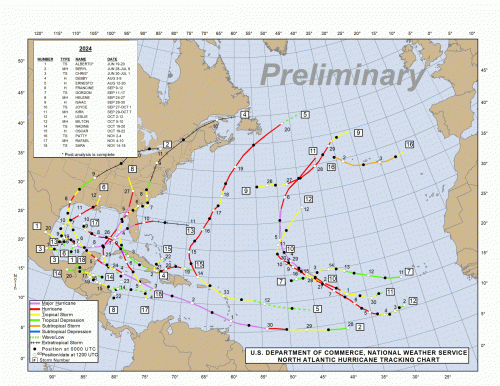After 18 tropical storms hit the Atlantic basin and new record temperatures in 2024, Florida legislators are proposing bills that tackle challenges related to climate and natural hazards:
Emergency Preparedness and Response
Every inch of Florida’s coastline has been impacted by hurricanes, and even if a hurricane makes landfall elsewhere in Florida, the consequences can often be seen all throughout the state. With hurricanes posing a wide-scale impact, legislators are proposing updates to emergency preparedness and response.

SB 180, introduced by Sen. Nick DiCeglie (R), along with two companion bills SB 1566, introduced by Sen. Corey Simon (R), and HB 1337, co-introduced by Rep. Mike Giallombardo (R) and Rep. Monique Miller (R), aim to enhance Florida’s emergency preparedness and response to natural disasters.
SB 180 calls for updated emergency management plans at the county and municipal levels. It proposes several measures to enhance Florida’s ability to manage and respond to emergencies. One key provision allows the Department of Environmental Protection to waive or reduce local government matching fund requirements for beach management and erosion control projects in counties affected by Hurricanes Debby, Helene, or Milton, as declared in federal disaster declarations in 2024. This waiver aims to expedite recovery efforts in severely impacted areas, ignoring permits and requirements that are in place to mitigate construction hazards on a beach.
The bill also introduces a tangible personal property assessment limitation for agricultural equipment rendered unusable due to the specified hurricanes. This is a temporary tax break designed to help farms and agricultural businesses recover from losses caused by hurricanes, by lowering the taxable value of damaged equipment and machinery. Also, the Division of Emergency Management’s funding prioritization for public hurricane shelters is revised to better address community needs. Additionally, certain service members are authorized to provide medical care in specific emergency circumstances, thereby enhancing medical response capabilities during disasters.
To improve statewide emergency preparedness, the bill mandates that the state comprehensive emergency management plan be updated. The Division of Emergency Management would be tasked with aiding political subdivisions and revising training requirements. An annual hurricane readiness session is to be conducted in each designated region, with mandatory attendance for all county emergency management directors. These sessions aim to address regional preparedness, evacuation strategies, and resource needs.
After facing the impacts of the 2024 hurricane season himself, Sen. DiCeglie wants to eradicate the bureaucracy of rebuilding; “homeowners struggling to put their lives back together after a storm should not have to deal with needless bureaucracy, or local governments that want to change the rules and use a disaster to create a different kind of community through red tape in the permitting process,” and wishes to streamline private property restoration after a storm.
UPDATE: SB 180 Signed by Officers and presented to Governor ; SB 1566 died in Community Affairs; HB 1337 died in Natural Resources & Disasters Subcommittee
Geoengineering and Weather Modification Activities
Sen. Ileana Garcia is ready to jump headfirst into the debate on chemtrails. As Sen. Garcia stated for Florida Politics, “Some would call it concerns. Others would call it conspiracy theories. But I thought that perhaps this bill would allow us to start somewhere where we can start to separate fact from fiction.”

Chemtrails is the term associated with long-lasting airplane contrails (the white cloudy lines left behind aircrafts) that some believe to be composed of harmful chemical or biological agents. This theory has been widely debated on and no evidence has been found to support it.
Similar bills SB 56, introduced by Sen. Ileana Garcia (R), and HB 477, introduced by Rep. Kevin Steele (R), address weather modification and geoengineering activities in Florida, with an emphasis on regulating and prohibiting certain practices. These bills seek to limit the modification of weather, temperature, and sunlight in the atmosphere, establishing restrictions on activities that could have environmental impacts. Both pieces of legislation aim to prevent intentional changes to atmospheric conditions, such as weather manipulation for agriculture, disaster mitigation, or other purposes, unless specifically authorized by state law. They lay out detailed definitions of weather modification activities and the conditions under which they may be permissible. These bills also establish a legal framework for oversight, with fines up to $100,000 and up to a second-degree misdemeanor if found guilty. This is a huge increase from the previous $500 penalty associated with weather modification.
In response to SB 56, Sen. Carlos Smith (D) offers a more safe-guarded opposition, stating that “as a lawmaker, generally I think that before we legislate, we should investigate. I don’t think it’s a good approach, public policywise, for us to pass the bill first and then see what happens after,” which cites the need for more research to be conducted before implementing a drastic measure that is based off a conspiracy theory.
In the Florida legislature, this is a bipartisan issue, at least in the House, with Rep. Yvonne Hinson (D) and Rep. Kim Kendall (R) co-sponsoring the bill, behind the introducer Rep. Steele. Even with that, this is a highly debated bill with an early 6-3 yes to no vote in the Senate Environment and Natural Resources Committee in the House and a 10-2 yes to no vote in the Senate Appropriations Committee on Agriculture, Environment, and General Government.
UPDATE: SB 56 Approved by Governor – Chapter No. 2025-157; HB 477 Laid on Table, refer to SB 56
Carbon Sequestration
Carbon Sequestration is the act of capturing and storing atmospheric carbon dioxide, to help mitigate global environmental shifts. In Florida, the Everglades is an important resource for capturing carbon and protecting the atmosphere from increased levels of carbon dioxide. You can check TESI’s YouTube video about carbon sequestration to learn more about the topic.
HB 1063, introduced by Rep. Lindsay Cross (D), with companion bill SB 1148, introduced by Sen. Ana Maria Rodriguez (R), focuses on the development and implementation of carbon sequestration strategies in the state. Both bills propose the creation of a Carbon Sequestration Task Force that would operate under the Florida Department of Environmental Protection (DEP). The task force’s primary role would be to explore, advise on, and help implement methods to enhance carbon sequestration.
These bills outline specific duties for the task force, including submitting annual reports to the Secretary of Environmental Protection, the Governor, and the Legislature. These reports would provide updates on the progress and effectiveness of carbon sequestration efforts, ensuring that the state’s strategies align with environmental goals. The task force will consist of experts from various fields, ensuring that the strategies are well-researched and effective.
In addition to its advisory role, they include a provision for funding the task force’s work, with an appropriation of $350,000 allocated for its operation in the 2025-2026 fiscal year. If passed, the changes will take effect on July 1, 2025 and will mark a significant step for Florida in addressing climate related events through proactive measures in carbon management.
UPDATE: SB 1148 died in Appropriations Committee on Agriculture, Environment, and General Government; HB 1063 died in Agriculture & Natural Resources Budget Subcommittee
Heat Illness Prevention
Extreme heat is the leading weather-related cause of death in the U.S., with Florida ranking second for the number of 911 calls related to heat-related incidents among outdoor workers. “Extreme heat” refers to intense heat, often combined with high humidity, that puts excessive strain on the body’s natural cooling system.

To help alleviate health issues that arise with extreme heat, two similar bills HB 35, introduced by Rep. Michael Gottlieb (D), and SB 510, introduced by Sen. Daryl Rouson (D), are focusing on heat illness prevention in outdoor workplaces. The bills would require certain employers to implement safety programs aimed at protecting employees from heat-related health risks. Specifically, employers in industries where outdoor work is common must develop a heat exposure safety program that is approved by the Florida Department of Health and other relevant agencies.
HB 35 outlines specific requirements for the safety programs, including protocols for monitoring heat exposure, providing access to water, offering regular rest breaks, and other preventive measures to protect workers from heat stress. Additionally, the bill emphasizes that employees must be educated about the dangers of heat illness and the steps they can take to stay safe, such as recognizing symptoms of heat stroke or heat exhaustion. It also specifies that employers are responsible for ensuring that their workers have access to the necessary resources to stay hydrated and cool during high heat conditions. Furthermore, it mandates annual training on heat illness prevention for both employers and employees. This training is intended to raise awareness of the risks associated with outdoor work in extreme heat and to ensure that workers know how to respond if they or their coworkers experience symptoms of heat-related illnesses. The bill, if passed, will become effective on October 1, 2025, providing time for employers to prepare their programs.
Both HB 35 and SB 510 aim to ensure that Florida workers are protected from the dangers of extreme heat by creating formal safety programs and education efforts. By mandating proactive measures, these legislative efforts aim to “[Protect] workers from heat stress in Florida… as a matter of health, safety, and fairness,” as stated by Rep. Anna Eskamani (D). However, Legislators that oppose the bill say that these regulations fall under the jurisdiction of OSHA (the federal Occupational Safety and Health Administration) and are giving the organization until 2028 to come up with formal regulations before the Florida Department of Commerce creates statewide rules on workplace heat and exposure.
Two similar bills were introduced before, but SB 706 (2023) died in the Commerce and Tourism Committee and SB 732 (2022) died in the Health Policy Committee.
UPDATE: SB 510 died in Commerce and Tourism ; HB 35 died in Industries & Professional Activities Subcommittee